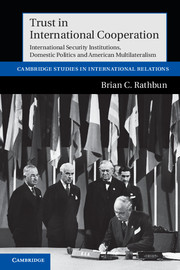 Trust in International Cooperation
Trust in International Cooperation Published online by Cambridge University Press: 05 June 2012
The United Nations is often seen as the inevitable by-product of the failure of both isolationism and idealism. In the conventional account, both Democrats and Republicans realized after Pearl Harbor that the United States could no longer remain aloof from world affairs and needed to commit to postwar international cooperation to lay the foundations of a stable peace. However, at the same time the League had been powerless to stop aggression in the 1930s. A more realistic view of international organizations was necessary, and President Roosevelt was not the idealist that Wilson was. The United Nations was therefore based on the realities of power politics, preserving a special role for the great powers and eschewing any generic commitment to territorial integrity as the League had in Article X. FDR advocated for a United Nations based on the continuation of the wartime alliance of the same name, in which the great powers would serve as “four policeman” enforcing the postwar peace.
In certain respects, this standard account is correct (Legro 2005; Patrick 2009). Isolationism as an ideology, the belief that the United States could avoid political engagement with other great powers, particularly malevolent European ones, was weakened (although not destroyed) by the war. Pure geographical isolation was impossible, and the prostrate Europeans were hardly dangerous rivals of the United States after 1945. However, as seen in Chapter 3, isolationism was not a significant force even in 1919. Conservative internationalists, predominantly in the Republican Party, continued to have objections to any form of international cooperation that required any significant transfer of American sovereignty. Again their competitive social orientation forbade them from surrendering any discretion over American foreign policy for fear of entrapment and exploitation. Conservatives again preferred a kind of concert for great-power consultation without any significant limitations on American discretion. Those who lacked generalized trust exhibited the same seeming paradox as the conservative internationalists of the interwar years. They were systematically more concerned about opportunism, but they opposed the creation of some sort of international hierarchy, either an international police force or elements of a world government, to prevent it. Dissenting voices from the liberal side of the Republican Party were completely marginalized. Indeed they often struggled to have the party officially endorse the creation of an international organization at all.
To save this book to your Kindle, first ensure no-reply@cambridge.org is added to your Approved Personal Document E-mail List under your Personal Document Settings on the Manage Your Content and Devices page of your Amazon account. Then enter the ‘name’ part of your Kindle email address below. Find out more about saving to your Kindle.
Note you can select to save to either the @free.kindle.com or @kindle.com variations. ‘@free.kindle.com’ emails are free but can only be saved to your device when it is connected to wi-fi. ‘@kindle.com’ emails can be delivered even when you are not connected to wi-fi, but note that service fees apply.
Find out more about the Kindle Personal Document Service.
To save content items to your account, please confirm that you agree to abide by our usage policies. If this is the first time you use this feature, you will be asked to authorise Cambridge Core to connect with your account. Find out more about saving content to Dropbox.
To save content items to your account, please confirm that you agree to abide by our usage policies. If this is the first time you use this feature, you will be asked to authorise Cambridge Core to connect with your account. Find out more about saving content to Google Drive.